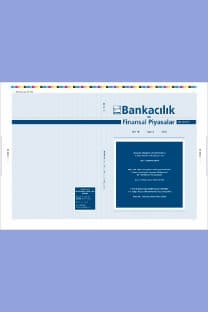Çalışmaya Tutkunluk ve İş Yaşam Dengesi Arasındaki İlişki: Banka Çalışanları Üzerine
Günümüzde profesyonel iş hayatında çalışan personel sayısının hızla artışıyla birlikte farklı sektörlerdeki işletmelerde yapılan araştırmalarda da bir takım yeni kavramlar ortaya çıkmaya başlamıştır. Özellikle yoğun çalışma saatlerinin olduğu mesleklerde iş yaşam dengesi, önemli bir konu haline gelmiştir. Aynı zamanda çalışanların işlerine olan tutkunluğu da işletmeler için mühimdir. Bu çalışmada, çalışma saatleri fazla olan ve yapılan iş açısından da yoğun çalışan bir sektör olan bankacılık alanında bir araştırma yapılmıştır. Bu çalışmada, çalışma saatleri yoğun olan bankacılık sektöründeki çalışanların demografik özellikleri ile çalışmaya tutkunlukları ve iş yaşam dengesi arasında ilişki olup olmadığı araştırılmaktadır. Araştırma sonucuna göre bankacılık sektöründe çalışmaya olan tutkunluk arttıkça yaşam odaklılık artmaktadır. Adanmışlık arttığında ise yaşamı ihmal etme durumu da artmaktadır.
Relationship Between Work Engagement and Work Life Balance: On Bank Employees
Nowadays, with the rapid increase in the number of personnel working in professional business life, a number of new concepts have started to emerge in the researches conducted in enterprises in different sectors. Work life balance has become an important issue especially in occupations with intensive working hours. At the same time, work engagement of the employees for their jobs is important for the enterprises. In this study, a research has been conducted in the banking sector, which has a long working hours and is also an intensive sector. It has been found that each sub-dimension of the passion for the study scale has had a significant relationship with each other In this study, it is investigated whether there is a relationship between work life balance and work engagement in the banking sector, which has intensive working hours.
___
- 1. Apaydın, Ç. (2011). Öğretim Üyelerinin İşe Bağımlılık Düzeyi ile İş-Yaşam Dengesi ve İş-Aile Yaşam Dengesi Arasındaki İlişki (Doktora tezi). Ankara Universities Egotism Balmier Enstitüsü, Ankara.
- 2. Bakker, A. B., ve Demerouti, E.. (2008). Towards a Model of Work Engagement, Career Development International, 13.3, 209-223.
- 3. Bakker, A.B. (2009). Building Engagement in the Workplace. Burke R. J. ve Cooper C.L. (Ed.). The Peak Performing Organization, Oxon, Routledge, 50- 72.
- 4. Bakker, Arnold B., ve Albrecht S.. (2018).Work Engagement: Current Trends. Career Development International 23.1 4-11.
- 5. Christian, M.S., Garza, A.S. ve Slaughter, J.E. (2011). Work Engagement: A Quantitative Review a Test of its Relations with Task and Contextual Performance, Personnel Psychology, 64.1, 89-136.
- 6. Costa, P.L., Passos, A. ve Bakker, A.B.. (2015). Direct and Contextual Influence of Team Conflict on Team Resources, Team Work Engagement, and Team Performance, Negotiation and Conflict Management Research, 8.4, 211-227.
- 7. Doğrul, B. Ş.,Tekeli, S.. (2010). “İş-Yaşam Dengesinin Sağlanmasında Esnek Çalışma”, Sosyal ve Beşeri Bilimler Dergisi, C: 2, S: 2.
- 8. González-Roma, V.; Schaufeli, W. B.; Bakker, A. B., ve Lloret, S.. (2006). Burnout and Work Engagement: Independent Factors or Opposite Poles? Journal of Vocational Behavior, 68, 165-174.
- 9. Greenhaus, J. H. ve Beutell, N. J.. (1985). Sources of Conflict Between Work and Family Roles, Academy of Management Review, 10.1, 76-88.
- 10. Greenhaus, J. H., Collins, K. M. & Shaw, J. D.. (2003) ‘The relation between work-family balance and quality of life’. Journal of Vocational Behaviour, 63 (3): 510-531.
- 11. Guest, D.. (2001), ‘Perspectives on the study of work-life balance’, Discussion paper prepared for the 2001 ENOP Symposium, Paris, 29–31 March, http:// www.ucm.es/info/Psyap/enop/guest.htm.
- 12. Gürel,P.A.. (2018). İş-Yaşam Dengesini Sağlayan Faktörlerin Kadın Akademisyenler İçin Belirlenmesi: Lojistik Regresyon Analizi, Kadın Araştırmaları Kongresi, Sayı 16, Sayfalar 31 – 44.
- 13. Human Resources and Skills Development Canada. (2005). What is work-life balance? Human Resources and Skills Development, Canada. http://www. hrsdc.gc.ca/eng/lp/spila/wlb/faq/01individuals.shtml. Erişim Tarihi: 12 Kasım 2018.
- 14. Kahn, W.A.. (1990). Psychological Conditions of Personal Engagement and Disengagement at Work. The Academy of Management Journal, 33(4), 692- 724.
- 15. Kahn, W.A.. (1992). To be Full There: Psychological Presence at Work. Human Relations, 45, 321-4
- 16. Maslach, C., ve Leiter, M.P.. (1997). The Truth about Burnout: How Organizations Cause Personal Stress and what to do about it. San Francisco, CA, Jossey-Bass, (books.google.com.tr, 11.01.2019).
- 17. Maslach, C.; Jackson, S.E., ve Leiter, M.. (1996). Maslach Burnout Inventory. Manual, Palo Alto, CA: Consulting Psychologists Press, (books.google.com. tr,10.01.2019).
- 18. May, D.R.; Gilson, R.L. ve Harter, L.M.. (2004). The Psychological Conditions of Meaningfulness, Safety and Availability and the Engagement of the Human Spirit at Work, Journal of Occupational and Organizational Psychology, 77, 11-37.
- 19. Naithani, P.. (2010). Recession and Work–Life Balance Initiatives. The Romanian Economic Journal, 13, 55–68.
- 20. Rich, B. L., Lepine, J. A. ve Crawford, E. R.. (2010). Job Engagement: Antecedents and Effects on Job Performance, Academy of Management Journal, 53.3, 617-635.
- 21. Rothbard, N.P.. (2001). Enriching or Depleting? The Dynamics of Engagement in Work and Family Roles, Administrative Science Quarterly, 46, 655-84.
- 22. Schaufeli, W.B., ve Bakker, A.. (2003(. UWES– Utrecht Work Engagement Scale, Preliminary Manual, Utrecht: Occupational Health Psychology Unit, Utrecht University.
- 23. Schaufeli, W.B., ve Bakker, A.B.. (2004). Job Demands, Job Resources and Their Relationship with Burnout and Engagement: A Multi-Sample Study, Journal of Organizational Behavior, 25, 293-315.
- 24. Schaufeli, W.B.; Salanova, M.; González-Romá, V. ve Bakker, A.B.. (2002). The Measurement of Engagement and Burnout: A Confirmative Analytic Approach, Journal of Happiness Studies, 3, 71-92.
- 25. Turgut, T. (2010). Çalışmaya Tutkunluk, G. İslamoğlu (Der.), Kurumlarda İyilik de Var. Nobel, Ankara,.57-89.
- 26. Turgut, T. (2011). Çalışmaya Tutkunluk: İş Yükü, Esnek Çalışma Saatleri, Yönetici Desteği ve İş-Aile Çatışması ile İlişkileri, Atatürk Üniversitesi İktisadi ve İdari Bilimler Dergisi, 25.3-4, 155-179.
- ISSN: 1307-5705
- Yayın Aralığı: Yıllık
- Başlangıç: 2007
- Yayıncı: Bankacılık Düzenleme ve Denetleme Kurumu
Sayıdaki Diğer Makaleler
Kredi Kartı Platformlarının Sezgisel Bulanık TOPSIS Yöntemi Kullanılarak Değerlendirilmesi
Elif ERER, Deniz ERER, Özge KORKMAZ
Çalışmaya Tutkunluk ve İş Yaşam Dengesi Arasındaki İlişki: Banka Çalışanları Üzerine
Ebru Özer TOPALOĞLU, Rukiye SÖNMEZ, Ayşe Elif YAZGAN
